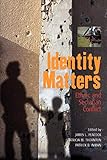Identity Matters : Ethnic and Sectarian Conflict / ed. by Patricia M. Thornton, Patrick B. Inman, James L. Peacock.
Material type: TextPublisher: New York ; Oxford : Berghahn Books, [2007]Copyright date: ©2007Description: 1 online resource (258 p.)Content type:
TextPublisher: New York ; Oxford : Berghahn Books, [2007]Copyright date: ©2007Description: 1 online resource (258 p.)Content type: - 9781845453114
- 9780857456892
- 305.8 22
- HM753 .I354 2009
- online - DeGruyter
| Item type | Current library | Call number | URL | Status | Notes | Barcode | |
|---|---|---|---|---|---|---|---|
 eBook
eBook
|
Biblioteca "Angelicum" Pont. Univ. S.Tommaso d'Aquino Nuvola online | online - DeGruyter (Browse shelf(Opens below)) | Online access | Not for loan (Accesso limitato) | Accesso per gli utenti autorizzati / Access for authorized users | (dgr)9780857456892 |
Frontmatter -- Contents -- Illustrations -- Acknowledgments -- Contributors -- Introduction: Identity Matters -- 1. Ethnic Conflict and Civic Nationalism: A Model -- 2. Social Identity Matters: Predicting Prejudice and Violence in Western Europe -- 3. Readiness to Fight in Crimea: How It Interrelates with National and Ethnic Identities -- 4. Ethnic Identities of the Karen Peoples in Burma and Thailand -- 5. European Attitudes toward Immigrants -- 6. Tibetan Identity in Today’s China -- 7. Cross-Cutting Identities in Singapore: Crabgrass on the Padang -- 8. The Casamance Separatist Conflict: From Identity to the Trap of “Identitism” -- 9. Manufacturing Sectarian Divides: The Chinese State, Identities, and Collective Violence -- 10. Islam and the West: A Perspective from Pakistan -- Conclusion: Ethnic and Sectarian as Ideal Types -- Index
restricted access online access with authorization star
http://purl.org/coar/access_right/c_16ec
In response to the attacks of September 11, 2001 and war in Afghanistan, the Fulbright New Century Scholars program brought together social scientists from around the world to study sectarian, ethnic, and cultural conflict within and across national borders. As one result of their year of intense discussion, this book examines the roots of collective violence — and the measures taken to avoid it — in Burma (Myanmar), China, Germany, Pakistan, Senegal, Singapore, Thailand, Tibet, Ukraine, Southeast Asia, and Western Europe. Case studies and theoretical essays introduce the basic principles necessary to identify and explain the symbols and practices each unique human group holds sacred or inalienable. The authors apply the methods of political science, social psychology, anthropology, journalism, and educational research. They build on the insights of Gordon Allport, Charles Taylor, and Max Weber to describe and analyze the patterns of behavior that social groups worldwide use to maintain their identities. Written to inform the general reader and communicate across disciplinary boundaries, this important and timely volume demonstrates ways of understanding, predicting and coping with ethnic and sectarian violence. Contributors: Badeng Nima, David Brown, Kwanchewan Buadaeng, Patrick B. Inman, Karina V. Korostelina, James L. Peacock, Thomas F. Pettigrew, Wee Teng Soh, Hamadou Tidiane Sy, Patricia M. Thornton, Mohammad Waseem.
Mode of access: Internet via World Wide Web.
In English.
Description based on online resource; title from PDF title page (publisher's Web site, viewed 25. Jun 2024)


